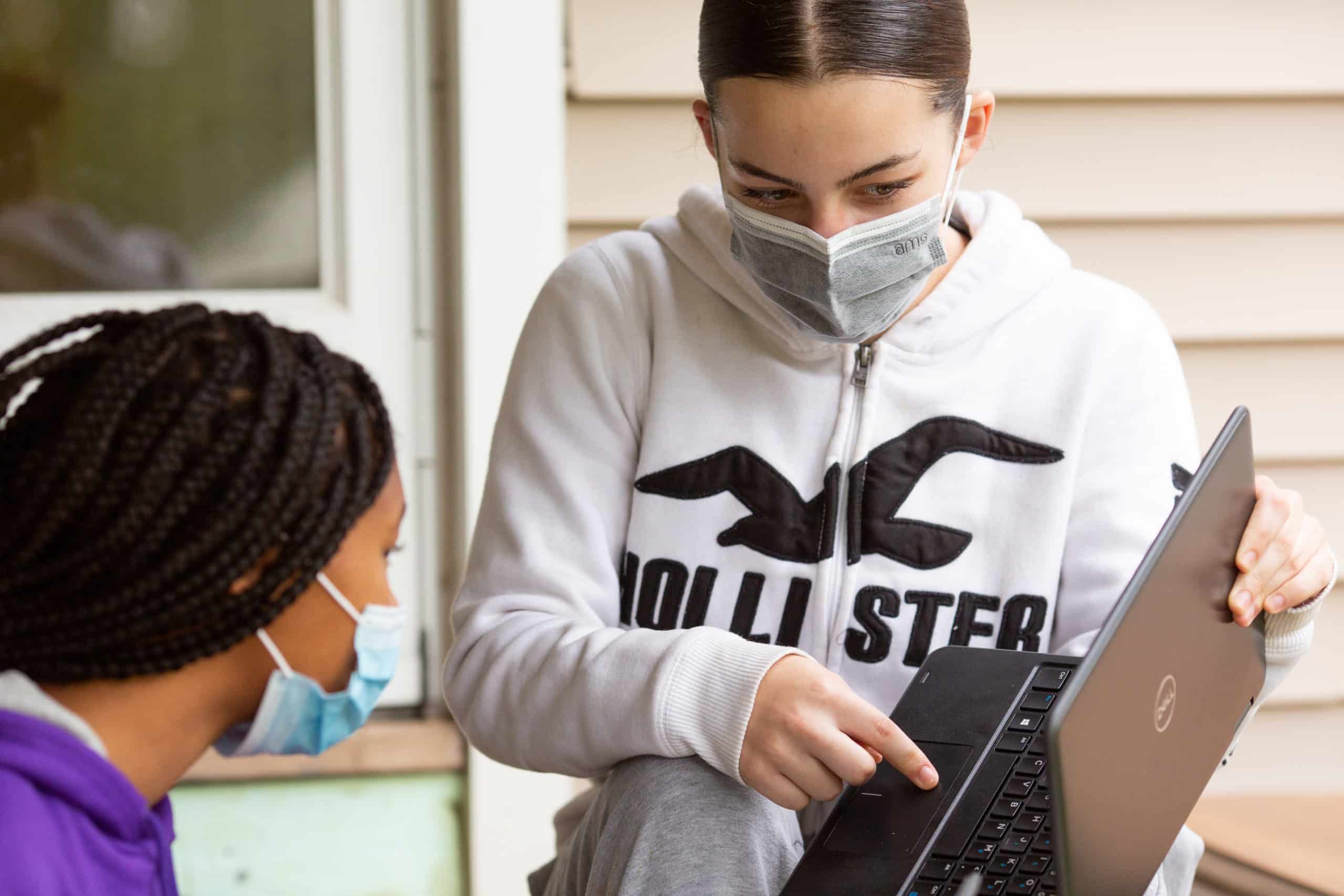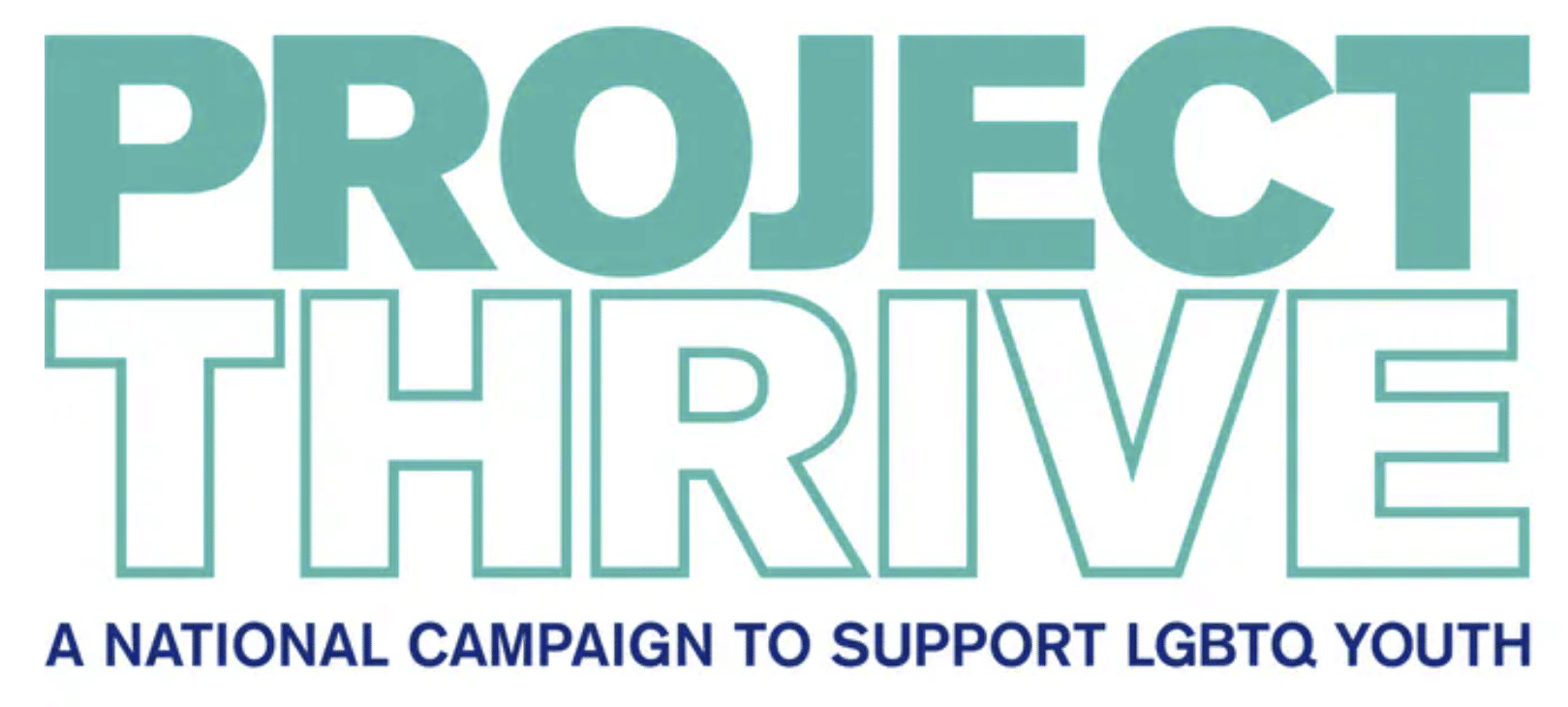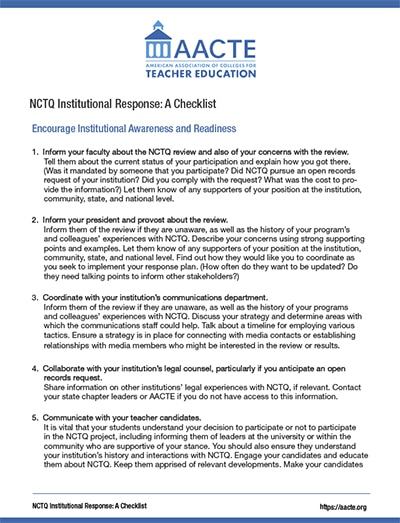15 Jun2021
By Katrina Norfleet
Ed Prep Matters is featuring a new series, “AACTE Teacher Stories,” to spotlight the experiences of K-12 educators who are attending or are alumni of AACTE member institutions. AACTE invites preservice and in-service school teachers to reflect on how they are applying the practices, frameworks, and strategies they acquired during their educator preparation program (EPP) studies to assure student success.
This series is an opportunity to showcase how EPP students successfully translate theory into practice. AACTE is currently seeking article submissions that address questions such as the following:
11 Jun2021
By Shalander Samuels
AACTE Teacher Stories is a new series highlighting the experiences of K-12 educators who are attending or alumni of AACTE member institutions.
 As an AACTE National Holmes Scholar who graduated from the University of Central Florida, I learned that to persevere I must overcome some fears regardless of how grand they might seem. After graduation, I opted to take the path of returning to the K-12 classroom as a teacher and reading specialist rather than transitioning to higher education. In the midst of COVID-19, I was uncertain and fearful, like many of my fellow teachers. The new school year highlighted my and others’ fears, forcing us to consider our roles as frontline workers in education. My English class read the text, What Fear Can Teach Us, a speech by Karen Thompson Walker. In her speech, Walker posits “We all know what it’s like to be afraid. We know how fear feels, but I’m not sure if we spend enough time thinking about what fear means.”
As an AACTE National Holmes Scholar who graduated from the University of Central Florida, I learned that to persevere I must overcome some fears regardless of how grand they might seem. After graduation, I opted to take the path of returning to the K-12 classroom as a teacher and reading specialist rather than transitioning to higher education. In the midst of COVID-19, I was uncertain and fearful, like many of my fellow teachers. The new school year highlighted my and others’ fears, forcing us to consider our roles as frontline workers in education. My English class read the text, What Fear Can Teach Us, a speech by Karen Thompson Walker. In her speech, Walker posits “We all know what it’s like to be afraid. We know how fear feels, but I’m not sure if we spend enough time thinking about what fear means.”
01 Jun2021
By Jane E. West and Kaitlyn Brennan
 This blog post is written by AACTE consultant Jane West and is intended to provide updated information. The views expressed in this post do not necessarily reflect the views of AACTE.
This blog post is written by AACTE consultant Jane West and is intended to provide updated information. The views expressed in this post do not necessarily reflect the views of AACTE.
Biden- Harris Administration Unveils Massive Budget with Historic Investments in Education
On the Friday before the long-awaited Memorial Day holiday, just as Members of Congress were headed home and the rest of us were finalizing our plans for the long weekend, the White House unveiled the complete version of the Biden-Harris Administration’s full budget proposal for FY 2022.
The budget proposal calls for $102.8 billion for the Department of Education—a $29.8 billion or 41% increase to the Department’s current spending levels. This increase in funding would be the largest increase the Department has seen since its inception in 1979.
25 May2021
By Jane E. West

This blog post is written by AACTE consultant Jane West and is intended to provide updated information. The views expressed in this post do not necessarily reflect the views of AACTE.
States Placing Legal Limits on How Educators Can Address Race
On the heels of Rep. Virginia Foxx (R-NC), the top Republican on the House Education and Labor Committee, backing two bills aimed at blocking the teaching of critical race theory in K-12 schools—four states have now passed legislation that would limit how teachers can discuss racism and sexism, among other topics. The legislation, passed so far in Idaho, Iowa, Oklahoma, and Tennessee, bans teachers from introducing certain concepts, including that any individual is consciously or unconsciously racist or sexist because of their race or sex, and that anyone should feel discomfort or guilt because of their race or sex. A similar law also passed in Arkansas. In total, lawmakers in at least 15 states have introduced bills that seek to restrict how teachers can discuss racism, sexism, and other social issues.
24 May2021
By JTE Insider

Photo by Allison Shelley for EDUimages
Listen to the recent JTE Insider podcast by the Journal of Teacher Education (JTE) editorial team. This blog is available to the public, and AACTE members have free access to the articles in the JTE online archives—just log in with your AACTE profile.
This podcast interview features insights from the article “Preparing Teachers for Relationships with Students: Two Visions, Two Approaches” by Victoria Theisen-Homer. The article was published in the May/June 2021 issue of the Journal of Teacher Education.
21 May2021
By Laurie Henry

Photo by Allison Shelley for EDUimages
This thought leadership article is written by an AACTE member. The views expressed in this post do not necessarily reflect the views of AACTE.
The COVID-19 pandemic has set back learning for millions of students and exacerbated existing educational inequalities countrywide. A recent study by McKinsey Analysis found that Black, Latinx and lower-income students are less likely to have access to high-quality remote learning, resulting in their falling further behind and expanding the achievement gap by 15% to 20%. To help these students overcome pandemic learning loss, the Partnering Aspiring Teachers with High-Need Schools (PATHS) to Tutor Act was introduced on February 25 by a bipartisan group, including Senators Cory Booker (D-NJ), John Cornyn (R-TX), Chris Murphy (D-CT), and Susan Collins (R-ME).
16 May2021
By Maria Salciccioli and Gretchen Mills

Prepared to Teach and WestEd have partnered on the Sustainability Project, a series of reports and interactive tools to support high-quality, financially sustainable teacher preparation. Three reports are being released this week through that project. Two are co-authored by Prepared to Teach and WestEd—Beyond Tuition, Costs of Teacher Preparation, and Going Further Together: Building Ownership and Engagement to Support High-Quality Teacher Preparation. The co-authored papers are being released simultaneously with a third piece authored by Prepared to Teach – Dollars and Sense: Federal Investments in Our Educator Workforce.
AACTE members know that aspiring teachers need high-quality, affordable options for teacher preparation—and research has shown that when candidates from diverse backgrounds have access to excellent programs, everyone benefits. Graduates of these programs stay in the classroom for longer and are more well-prepared than their peers who become teachers through faster, less rigorous pathways to the classroom.[1]
14 May2021
By NAPDS
As a member of the National Coalition of Educators, AACTE announces the release of the second edition of What it Means to be a Professional Development School: Nine Essentials, published by fellow member coalition member, the National Association for Professional Development Schools (NAPDS). AACTE shares NAPDS’s goal to support high quality teacher education through effective professional development and are looking forward to collaborating with them on projects aimed at achieving that goal.
The National Association for Professional Development Schools (NAPDS) recently announced the publication of its policy statement, What it Means to be a Professional Development School (PDS): The Nine Essentials (2nd Edition), a culmination of several years’ worth of work by the association’s Nine Essentials Committee. The committee worked to identify the relevance of the essentials, which were originally published in 2008, and how they are used in the field by schools of education and P-12 schools. The document brings to light an updated and robust version of the Nine Essentials grounded in key concepts and educational research.
14 May2021
By Nicole Dunn
 AACTE is honored to share that it has joined the leaders from the nation’s largest health, education, child welfare, legal, and juvenile justice organizations in support of the Human Rights Campaign’s Project THRIVE, a multi-year national campaign to create more equitable, inclusive support systems and communities for LGBTQ youth. The initiative will build the skills and capacities of all youth-serving professionals to better meet the needs of LGBTQ young people.
AACTE is honored to share that it has joined the leaders from the nation’s largest health, education, child welfare, legal, and juvenile justice organizations in support of the Human Rights Campaign’s Project THRIVE, a multi-year national campaign to create more equitable, inclusive support systems and communities for LGBTQ youth. The initiative will build the skills and capacities of all youth-serving professionals to better meet the needs of LGBTQ young people.
Every organization that is part of Project THRIVE has a unique role to play in strengthening family permanence and support, improving health and well-being, increasing school connection, and building a foundation of resilience so that all LGBTQ youth can thrive. Project THRIVE is committed to an intersectional approach in this work, and to ensuring that LGBTQ youth of color and those who are system-involved or have a history of homelessness are a priority focus.
11 May2021
By Leslie T. Fenwick

Illustration by Paige Vickers
This opinion article by AACTE Dean in Residence Leslie T. Fenwick was published in Politico and is reprinted with permission.
The COVID-19 pandemic has exacerbated harmful educational inequalities in the preK-12 public education system. The nation’s poorest students, Black and Latino students, and our disabled students have been the most negatively impacted by school closings necessitated by the pandemic. Black students in high poverty schools have been especially hard hit because of the racialized, historic, and ongoing disinvestment in the education of Black children and youth.
10 May2021
By Mark J. Hofer, Teresa Foulger, Kevin J. Graziano, John K. Lee, Denise Schmidt-Crawford and David Slykhuis
AACTE is partnering with the Society for Information Technology and Teacher Education (SITE) to provide AACTE members with a reduced rate for the Teacher Educator Technology Competencies (TETC) professional development modules. Learn more about the series of self-paced online courses from the TETC research team.
Looking back, it seems as if we have been on an almost impossible journey. In response to the emerging COVID-19 pandemic in March 2020, we faced the closure of campuses and an abrupt and extraordinarily difficult transition to remote teaching and learning. Given the relational and experiential nature of teaching, remote learning has been particularly difficult for teacher preparation programs. We found it extraordinarily difficult to replace the modeling and mentoring that our pre-service teachers needed using remote experiences. Working from home and balancing various responsibilities including caring for loved ones and supporting our own children’s learning only added to the challenge. Undoubtedly, this has been one of the most challenging times many of us have ever experienced.
And yet, despite all this, there have been some bright spots. Faculty have explored new ways of guiding learning, developed a range of new skills with educational technologies, and were reminded of the value and importance of deep human connection in teaching and learning (Ferdig et al., 2020). Some faculty have even reported that they are planning to carry over aspects of remote teaching when they transition back to the “normalcy” in our schools and classrooms; whatever that will be (also, see these hopeful posts on the AACTE blog, Clausen, et al, 2021; Hyler, 2020; Slykhuis, 2020).
06 May2021
By Rebekah Saylors
For the fifth consecutive year, Appalachian State University leads the nation for the number of its Reich College of Education (RCOE) alumni who are National Board Certified Teachers (NBCT).
The national certification is based on a rigorous performance-based assessment that typically takes from one to three years to complete and measures what accomplished teachers and counselors should know and be able to do.
The university topped the National Board for Professional Teaching Standards’ list of “Top 50 Alma Maters by Total Number of NBCTs” for 2020, with 2,178 alumni having earned the national credential to date.
06 May2021
By Jasmine Estes
AACTE congratulates 2021 National Teacher of the Year Juliana Urtubey and AACTE member Institution The University of Arizona (UArizona) for preparing her for a distinguished teaching career. Urtubey holds a bachelor of arts in bilingual elementary education and a master’s degree in special bilingual education from UArizona.
 The Council of Chief State School Officers (CCSSO) today announced that Juliana Urtubey, an elementary school special education teacher, is the 2021 National Teacher of the Year.
The Council of Chief State School Officers (CCSSO) today announced that Juliana Urtubey, an elementary school special education teacher, is the 2021 National Teacher of the Year.
Urtubey, an educator for 11 years, teaches at Kermit R. Booker, Sr. Innovative Elementary School in Las Vegas, where she serves as a co-teacher in pre-kindergarten through fifth-grade special education settings and as an instructional strategist developing supports to meet students’ differing academic, social-emotional, and behavioral needs.
Known as “Ms. Earth” for her efforts to beautify schools and unify the community through murals and gardens, Urtubey has helped raise funds for garden programs at two Las Vegas schools. In one program, the garden was tended to by the student “Garden Gnomies” club and offered opportunities for innovative student learning and intergenerational learning and connections to the wider community.
23 Apr2021
By Allie Dupont

Over the past year, educators across America put everything they have into keeping students educated and engaged. Now, as we look to the future—and begin our return to the classroom—where can we find the support and inspiration needed to tackle the road ahead?
Through the Teachers Community Hub, a new resource from education nonprofit Roadtrip Nation, educators and aspiring educators everywhere can find that support—and reconnect to their power and purpose as teachers. The Teachers Community Hub brings together video interviews between educators around the campaign “Why We Teach,” as well as support for navigating obstacles inside and outside of the classroom.
23 Apr2021
By Ward Cummings
 AACTE is the leading voice on educator preparation and is dedicated to providing member resources to support the profession. As such, AACTE has developed materials to help members respond to the reports produced by the National Council on Teacher Quality (NCTQ). The NCTQ reports reflect flawed methodologies and practices to rate educator preparation programs, and AACTE members should make their voices heard to address the misrepresentation of their programs.
AACTE is the leading voice on educator preparation and is dedicated to providing member resources to support the profession. As such, AACTE has developed materials to help members respond to the reports produced by the National Council on Teacher Quality (NCTQ). The NCTQ reports reflect flawed methodologies and practices to rate educator preparation programs, and AACTE members should make their voices heard to address the misrepresentation of their programs.
Members of the AACTE Government Relations Committee and Advisory Council of State Representatives collaborated to produce recommendations to assist members’ efforts in taking control of the narrative about their educator preparation programs. The NCTQ Checklist is designed to help AACTE members develop strategic and tactical solutions to reframe the misinformation that NCTQ has published.







 As an AACTE National Holmes Scholar who graduated from the University of Central Florida, I learned that to persevere I must overcome some fears regardless of how grand they might seem. After graduation, I opted to take the path of returning to the K-12 classroom as a teacher and reading specialist rather than transitioning to higher education. In the midst of COVID-19, I was uncertain and fearful, like many of my fellow teachers. The new school year highlighted my and others’ fears, forcing us to consider our roles as frontline workers in education. My English class read the text, What Fear Can Teach Us, a speech by Karen Thompson Walker. In her speech, Walker posits “We all know what it’s like to be afraid. We know how fear feels, but I’m not sure if we spend enough time thinking about what fear means.”
As an AACTE National Holmes Scholar who graduated from the University of Central Florida, I learned that to persevere I must overcome some fears regardless of how grand they might seem. After graduation, I opted to take the path of returning to the K-12 classroom as a teacher and reading specialist rather than transitioning to higher education. In the midst of COVID-19, I was uncertain and fearful, like many of my fellow teachers. The new school year highlighted my and others’ fears, forcing us to consider our roles as frontline workers in education. My English class read the text, What Fear Can Teach Us, a speech by Karen Thompson Walker. In her speech, Walker posits “We all know what it’s like to be afraid. We know how fear feels, but I’m not sure if we spend enough time thinking about what fear means.” This blog post is written by AACTE consultant Jane West and is intended to provide updated information. The views expressed in this post do not necessarily reflect the views of AACTE.
This blog post is written by AACTE consultant Jane West and is intended to provide updated information. The views expressed in this post do not necessarily reflect the views of AACTE. 



 AACTE is honored to share that it has joined the leaders from the nation’s largest health, education, child welfare, legal, and juvenile justice organizations in support of the Human Rights Campaign’s Project THRIVE, a multi-year national campaign to create more equitable, inclusive support systems and communities for LGBTQ youth. The initiative will build the skills and capacities of all youth-serving professionals to better meet the needs of LGBTQ young people.
AACTE is honored to share that it has joined the leaders from the nation’s largest health, education, child welfare, legal, and juvenile justice organizations in support of the Human Rights Campaign’s Project THRIVE, a multi-year national campaign to create more equitable, inclusive support systems and communities for LGBTQ youth. The initiative will build the skills and capacities of all youth-serving professionals to better meet the needs of LGBTQ young people.
 The Council of Chief State School Officers (CCSSO) today announced that Juliana Urtubey, an elementary school special education teacher, is the 2021 National Teacher of the Year.
The Council of Chief State School Officers (CCSSO) today announced that Juliana Urtubey, an elementary school special education teacher, is the 2021 National Teacher of the Year.
 AACTE is the leading voice on educator preparation and is dedicated to providing member resources to support the profession. As such, AACTE has developed materials to help members respond to the reports produced by the National Council on Teacher Quality (NCTQ). The NCTQ reports reflect flawed methodologies and practices to rate educator preparation programs, and AACTE members should make their voices heard to address the misrepresentation of their programs.
AACTE is the leading voice on educator preparation and is dedicated to providing member resources to support the profession. As such, AACTE has developed materials to help members respond to the reports produced by the National Council on Teacher Quality (NCTQ). The NCTQ reports reflect flawed methodologies and practices to rate educator preparation programs, and AACTE members should make their voices heard to address the misrepresentation of their programs.